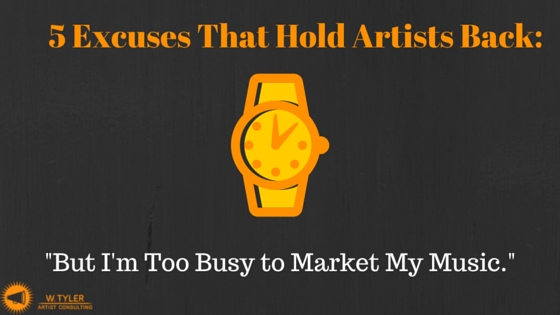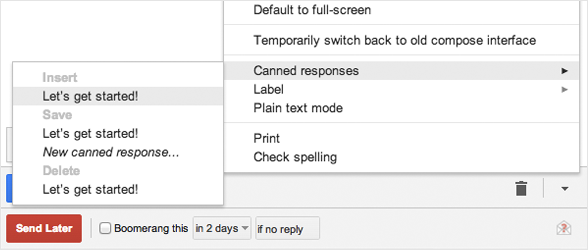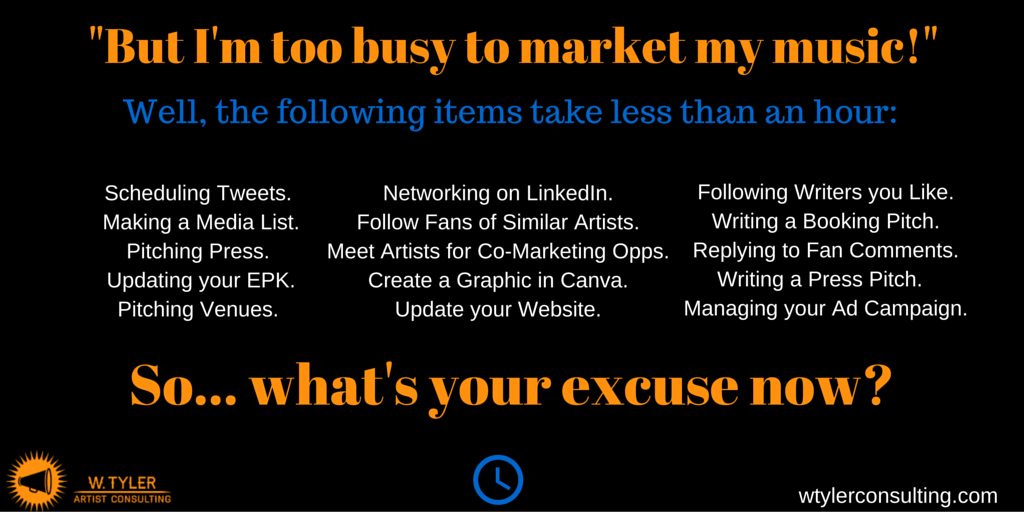Nine times out of ten, the things that hold us back are the lies in which we tell ourselves.
Last week we talked about the commonly used excuse, “marketing is too expensive”. We discussed ways that one can market their work for $0.00.
Because can marketing be expensive? Yes.
Is there a time you need to invest some in your career? Probably.
But there are dozens of things you can do today, for free, that will help boost your career.
This week, we’ll be moving on to another commonly used “excuse”. Now, I’ll say this again because it bears repeating — let’s not get excuses mixed up with reasons. Sure, there are reasons out there that stunt artists growth. This could be genuine financial issues, health issues or even geographic issues. But we’re not talking about reasons. We’re talking about excuses.
We’re talking about the small things we tell ourselves that are just lies. The myths that we hold as “truths” because they make us feel comfortable and safe.
But sometimes, we need to bust through those comfort zones to see just how far we can take our career.
This week’s excuse that holds us back:
I am too busy or don’t have the time to market my work.
I get this one, I really do. Time management is damn difficult, I think we’d all be more successful, happy and rich if we could just put in just a few more hours of work. But sometimes, it’s just not physically, mentally or emotionally possible.
Also, the majority of musicians don’t have the pleasure of being a full-time artist. Many musicians have day jobs, side gigs and other avenues to make ends meet while they hustle out their careers.
I get it.
However, this brings up two very important reminders:
If you create a killer album, but it’s just collecting dust in the corner of SoundCloud, does it really make a sound?
Also…
Your career isn’t about talent, it’s not about skill. It’s about perseverance –it’s about who can stay on the treadmill the longest.
Point being: If you create good art, it’s not going anywhere if you don’t promote it properly, so, what was the point?
And secondly, and of equal importance, this hustle takes work. It takes carving out the time, whether that’s an hour a day, 30 minutes at night or hour or two on weekends. Even then, results won’t happen overnight. It takes effort.
And your effort, will never betray you.
Let’s discuss.
Schedule Your Posts In Advance: 1-2 hours, a week.
Listen, you need to be active on your social media, and in a real, authentic, genuine way. I feel as if some artists, and also major brands, schedule far too much of their content. It makes their outlets lose a personal touch. It almost takes the “social” side out of social media.
However, scheduling content in advance can be incredibly useful for artists. I recommend spending time identifying your major marketing goals. This might be promoting an upcoming show, or pushing a particular single.
Once you’ve identified those marketing objectives, create your posts, and schedule ’em. You can schedule Facebook posts directly through Facebook, but I’d recommend looking into HooteSuite or Buffer for all of your necessary outlets.
Personally, I dig Buffer as it automatically chooses to post at your distinct “peak times”. I also enjoy them because they automatically import images on Twitter when sharing links, which is ideal. Their free program is pretty great, as is HooteSuite.
You should mainly use scheduling for your marketing messages. These are those distinct show promotion posts, or pushing your latest single.
Sure, maybe schedule some material from artists you dig or articles you recently checked out. But for the most part, I’d recommend scheduling your weekly marketing posts, to really get that out of the way.
So, that show you have coming up? You already scheduled promo posts for it. That single you’re trying to build buzz for, you know it’ll be going out every other day or so in unique, fun ways.
Of course, be smart about your content and the way you push your marketing posts. You don’t want to spam. However, taking a few minutes a day to knock out those necessary marketing posts saves you a lot of time and energy.
Better yet, take an hour one day a week, and just schedule these in advance for the entire week.
One hour. That’s it. Most of your heavy social media lifting for the week is already over. This leaves you time to actually connect with fans and post other brand building, and personal posts on your social media outlets.
Tweet & Post… Like You Probably Already Do: 30 minutes + a Day
Social Media is one of the biggest time-wasters for everyone, but what blows my mind, is that it’s also the biggest way to market your work.
I see so many artists sharing memes, random thoughts and live-tweeting Empire and Real Wives of Hip Hop, to the point where I usually forget they’re even artists.
You may see me write about the 70-20-10 rule a lot. It’s a rough rule, but it’s a good template for a healthy mix of content. You don’t want to spam your fans with music, but you also don’t want them to forget about your work. 70% of your posts should be brand building — you in the studio, posts about your work. 20% of your posts should be misc. personal posts (the aforementioned live tweets and random thoughts), and then 10% should be your marketing/promo posts.
Roughly 70% of your posts should be brand building — you in the studio, posts about your work. 20% of your posts should be misc. personal posts (the aforementioned live tweets and random thoughts), and then 10% should be your marketing/promo posts.
Well, we already discussed scheduling your 10% marketing posts, and you’re already giving opinions on TV shows and input in your life (which is a thing fans do care about), so — while you’re logged in, sprinkle in “brand building posts”.
Remind your followers that you’re an artist. Post photos of you in studio, clips of your music, photos of live performances. Or even tweets thanking your followers, or even your thoughts on the industry itself. Talk about your dreams, talk about your goals, you’re already logged in, you might as well promote your brand as an artist.
And while you’re logged in…
Network!
Connect with fans of similar artists, share stories from writers you want to connect with — even send writers tweets, authentically introducing yourself and your work. Be social, be real, and be authentic.
I can’t stress enough, that you can literally build your entire brand from “messing around” on social media. Sure — it’s not really messing around. There’s a method to it. You have to have a good balance of content (which we discussed in the 70-20-10 rule), your content also has to be fun and interactive. You also have to try to meet new people and be sincere about it. But really guys, this is 80% of marketing your music. Just… being active online. And chances are, if you’re holding down a day job, you’re likely browsing Twitter on the low-anyway. Might as well use it to build your music.
Build Your Media Lists: At Your Own Pace
If you’re ever looking to pitch your pitch your music, you’re going to need a media list. Hopefully, you’ve been using social media to connect with writers already and I promise, if you ask for their email 9 times out of 10, they’ll give it to you. Why? Because a massive part of their day is going through pitches. It’s literally their job.
But here’s the thing: not all outlets are created equal. You have some major media outlets that won’t going to be as likely to picking up and posting new talent, then you’ll have the few that are perfect.
You also might have some outlets that are good for your music, and some others that would be a stretch. This takes research and research takes … time.
But here’s the beauty of it. Once you have a solid list it rarely needs upkeep. I have two media lists — one is my personal connection list. These are the folks who’s numbers are saved in my phone, the one’s I joke around online with and speak to pretty frequently. They’re the ones that I know when I call, they’ll pick up.
Then there’s my larger media list. Most of these folks I’ve spoken with or worked with, but we really only connect when I have something to shoot their way. Which is fine — this is generally how PR works. On this list, there’s also folks that I’ve never spoken with other than to submit music.
If you just want to start off by building a small list of 5-10 writers that you’re close with — perfect. Because to be honest, that might be all that you need. Take your time in building your list.
You can build your media list a few ways. The most simple way is finding active writers on the outlet you’re searching for.
Then..Google their name.
You’ll be surprised at how often they have a portfolio or Twitter, both with contact information. Connect with these folks, connect with them, be real with ’em, though. Don’t just hit them for marketing and dip, engage with their social channels. Be a human being.
Other ways to find writers info are through lead generation services, such as ZoomInfo. This is pretty reliable for finding writer’s contact info. Another way? Directly on the outlets website.
Spending a few hours one week out of the year to do this, and you’re set. Sure, add onto this list every few months, and also remove any bounceback emails, but once you have a healthy list, you’re really.. done for quite some time.
Pitching Press, Venues, Etc…: 1-2 hours a week, max.
Pitching your work is necessary, but it’s also something that can be done fairly methodically through scheduling. The thing about any form of pitching is that you don’t want it to be too “robotic” or seem as if it was copy and pasted, however, you also don’t want it to take too much time, right?
First, develop a solid pitch. Something no more than 2-3 paragraphs, with all of your links. Write it in a way that you can easily add in other information.
For instance:
“Good Morning,
Just wanted to shoot over some…”
Can easily be adjusted to:
“Good Morning, Jeff.
Really love all that you do at New Music Everyday, especially your latest on Bryson Tiller. Just wanted to shoot over some…”
Okay, here’s you balling on a budget tip of the week and it’s a big one…
Once you have a quick brief pitch template up, I recommend downloading the Google Plugin, Boomerang. Boomerang allows you to schedule emails in advance.
Then, turn on Gmail’s “Canned Response” feature, which is a feature already in your Gmail preferences. This allows you to pull up a pre-written email template (aka your pitch) with the click of a button.
Therefore now, you just have to pull up the template, customize it a bit for the writer/venue, and schedule it in advance. Then, go ahead and schedule a follow-up email two or three more times.
It may take you a few minutes to get used to, but once you master it, you can easily schedule press/booking emails and follow up emails for your entire week, in less than an hour.
You just have to remember that if you get a reply — take them off of that scheduled follow-up list.
This is a huge time-saver, and — more importantly, it’s much more effective than BCCing 500 writers your links without a proper pitch or follow up.
So, let’s recap:
Scheduling Social Media: 1 hour a Week
Interacting on Social Media: Minimum of 30 minutes a Week
Building a Media List: 2 Hours a Week ( then as needed)
Pitching Writers: 1 hours a week.
The above is less than 5 hours a week, which I think is beyond realistic. That 5-hour estimate slips even lower when you see that building a media list is a one and done project, that just needs occasional maintaining.
So, do you have around an hour a day to market your work?
No, really ask yourself that…
I’ll wait.
…..
Do you have 1 hour a day to market your work?
I really hope you’re thinking: Only one hour a day?! I can probably factor in more than that!
Because in reality, an hour a day can get you pretty far and it’s plenty to keep you on the track to success (especially if you’re diligent about it). But you can probably scrounge in more time to simply connect with musicians on Instagram to garner an opening slot for a gig, or connect with writers on Twitter to establish a relationship.
Once you start digging into making your media list, I can guarantee that you’re going to enjoy the process and add that into your daily routine. Because researching for your art’s well-being is fun, not tedious.
You’re also going to find that scheduling content is great, but what’s even more enjoyable is going in and responding to your fans reactions to it.
Yes, the more time you put into networking and marketing, the quicker you’ll see waves. However, even an hour a day of good marketing can easily outshine hours upon hours of poor networking and unprofessional pitches.
The less you count-down minutes and the more you see this as simply socializing with fans, writers, venues and more — this becomes less of a chore and more of just your normal routine.



